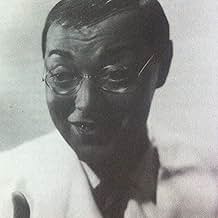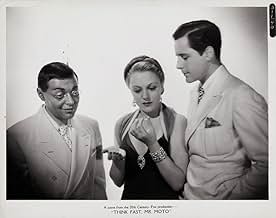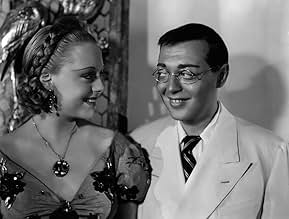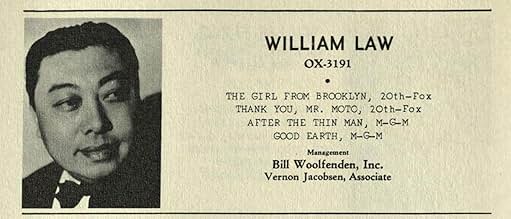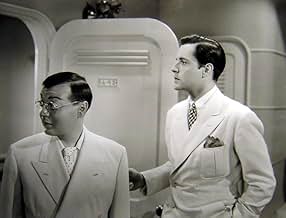IMDb-BEWERTUNG
6,7/10
1304
IHRE BEWERTUNG
Füge eine Handlung in deiner Sprache hinzuOn a freighter going from San Francisco to Shanghai Mr. Moto solves mysteries caused by a gang of smugglers.On a freighter going from San Francisco to Shanghai Mr. Moto solves mysteries caused by a gang of smugglers.On a freighter going from San Francisco to Shanghai Mr. Moto solves mysteries caused by a gang of smugglers.
Sig Ruman
- Nicolas Marloff
- (as Sig Rumann)
Frederik Vogeding
- Curio Dealer
- (as Fredrik Vogeding)
Philip Ahn
- Switchboard Operator
- (Nicht genannt)
Richard Alexander
- Ivan - Doorman
- (Nicht genannt)
Lloyd Allen
- Nightclub Trombonist
- (Nicht genannt)
William A. Boardway
- Ship Passenger
- (Nicht genannt)
Dudley Brooks
- Nightclub Pianist
- (Nicht genannt)
George 'Red' Callender
- Nightclub Bassist
- (Nicht genannt)
Marcello Estorres
- Ship Passenger
- (Nicht genannt)
Empfohlene Bewertungen
WITH THE SUCCESS and high popularity of the CHARLIE CHAN Series of movies, the logical next step was for some one to bring us another outstanding sleuth of Oriental extraction. There would be inevitable comparisons and "copycat" accusations. Certainly there is some similarity and there are some definite signs of, if not stealing, at least borrowing from the established CHAN franchise.
BUT THAT IS where the similarities end. For Moto is much more of a solitary operator; even though he does employ some operatives in this, the first movie in the series. Also, Moto's deducting appears to be much more introspective, silent and quietly disarming to friend and adversary alike.
THAT THE CHARACTER proved to be popular enough to have his own series of seven more entries into the series was largely due to the performance of the former Laszlo Lowenstein; now known to the world as Peter Lorre.
BUT THIS STAR'S tour de force, excellent production values, talented & ample supporting cast and memorable musical score wasn't enough to carry the series for more that its three years and eight movies. For the year was 1937 and the Imperial Japanese war machine was already conducting a war of conquest against China; after having conquered Manchuria in 1931.
THE ATROCITIES OF Pearl Harbor, Manila and Singapore, among others, would soon follow. The days of a Japanese super sleuth on our movie screens were numbered.
BUT THAT IS where the similarities end. For Moto is much more of a solitary operator; even though he does employ some operatives in this, the first movie in the series. Also, Moto's deducting appears to be much more introspective, silent and quietly disarming to friend and adversary alike.
THAT THE CHARACTER proved to be popular enough to have his own series of seven more entries into the series was largely due to the performance of the former Laszlo Lowenstein; now known to the world as Peter Lorre.
BUT THIS STAR'S tour de force, excellent production values, talented & ample supporting cast and memorable musical score wasn't enough to carry the series for more that its three years and eight movies. For the year was 1937 and the Imperial Japanese war machine was already conducting a war of conquest against China; after having conquered Manchuria in 1931.
THE ATROCITIES OF Pearl Harbor, Manila and Singapore, among others, would soon follow. The days of a Japanese super sleuth on our movie screens were numbered.
On a freighter going from San Francisco to Shanghai, Mr. Moto (Peter Lorre) solves mysteries caused by a gang of smugglers. First of the series.
Director Norman Foster was given this B-movie assignment, but it is probably better remembered today than many of the A pictures that came out at the time. With Peter Lorre, a strong (if under-appreciated) actor taking the lead, this was guaranteed to be something special.
Say what you will about the racism, sexism, or anything else of this nature. Such things have to be overlooked sometimes, and this is one of those times. The film is just too clever to be faulted.
Director Norman Foster was given this B-movie assignment, but it is probably better remembered today than many of the A pictures that came out at the time. With Peter Lorre, a strong (if under-appreciated) actor taking the lead, this was guaranteed to be something special.
Say what you will about the racism, sexism, or anything else of this nature. Such things have to be overlooked sometimes, and this is one of those times. The film is just too clever to be faulted.
The shame of the Japanese-American concentration camps has cast a shadow over the Mr. Moto series, giving it a sorry reputation as an artifact of Hollywood racism. The truth is that as far as European-in-yellowface portrayals of Asians went, Peter Lorre's Moto was far less racist and considerably more sympathetic than the clownish, epigram-spouting Charlie Chan. In fact, it's easy to forget Moto's Japaneseness altogether and just view him as yet another wondrous manifestation of the white-linen-suited, Austrian-accented Lorreness so prevalent between the wars in films like "Strange Cargo," "Island of Doomed Men," und so wieter. Audiences certainly took to the little fellow in this first entry in the series, which introduces Moto in all his enigmatic glory--the bemused, politely ironical man of action with his love of kittycats, preference for cow's milk over whiskey, and disdainful conviction that beautiful women only confuse a man. Though Lorre reportedly had no idea what the whole thing was supposed to mean and spent his time offstage disconsolately listening to his archenemy Hitler on the radio, the eight Moto films established him as one of Hollywood's most beloved personalities and gave millions of small men who wore glasses the hope that they, too, could be strong and adorable.
Ah, the Thirties. What could be more elegant and enjoyable than an ocean liner to the Orient, with two heartbreakingly beautiful people having a shipboard romance while criminal intrigue sort-of-kind-of goes on around them and they are watched over by a genial Japanese man who may or may not be a good guy? And that's really about all there is to the slapdash plot of the first movie in the Mr. Moto series. Yes, there's something about diamond smuggling and murder, but the main point of this story seems to be to introduce the world to the polite but dangerous gentleman from Japan.
And that is something that surprised me about this little movie (it clocks in at under 70 minutes) -- just how dangerous Mr. Moto is. Throughout the first hour he is presented as someone who's more interested in making an allegiance with the smugglers than stopping them. The movie begins with him in disguise looking into the San Francisco end of the smugglers, seeing -- but not reporting -- a murdered body and getting away so he can quietly head for Shanghai. He shows he's a black belt in jiu-jitsu by tossing a few disrespectful drunks around, including the son of the man who owns the ocean liner he's traveling on. And he kills a killer in such a way that no one can find the body...then calmly, albeit a bit sadly, continues his secretive journey. It's not until the last few minutes of the movie that his real purpose and superior intelligence is revealed. To have a Japanese man out-thinking all the sneaky Caucasian minds around him is really quite startling for 1937, considering the casual xenophobia of the time.
"Think Fast, Mr. Moto" may be an obvious attempt to capitalize on the hugely popular (and usually much better) "Charlie Chan" series of mysteries, but it works very well in its own right. Peter Lorre does a fine job (of course) pretending to be Japanese, but something that I've never understood is why Thomas Beck never got to be big in Hollywood. He has such a natural grace in front of the camera, and he's extremely good-looking. The same holds for Virginia Field, though she did have more of a career than he. The production values are above average for a "B" movie and the pace is relatively brisk. If they'd just done a better job with the script, it could have been on the same level as "Charlie Chan in Shanghai." But as it is, it's still surprisingly fun.
And that is something that surprised me about this little movie (it clocks in at under 70 minutes) -- just how dangerous Mr. Moto is. Throughout the first hour he is presented as someone who's more interested in making an allegiance with the smugglers than stopping them. The movie begins with him in disguise looking into the San Francisco end of the smugglers, seeing -- but not reporting -- a murdered body and getting away so he can quietly head for Shanghai. He shows he's a black belt in jiu-jitsu by tossing a few disrespectful drunks around, including the son of the man who owns the ocean liner he's traveling on. And he kills a killer in such a way that no one can find the body...then calmly, albeit a bit sadly, continues his secretive journey. It's not until the last few minutes of the movie that his real purpose and superior intelligence is revealed. To have a Japanese man out-thinking all the sneaky Caucasian minds around him is really quite startling for 1937, considering the casual xenophobia of the time.
"Think Fast, Mr. Moto" may be an obvious attempt to capitalize on the hugely popular (and usually much better) "Charlie Chan" series of mysteries, but it works very well in its own right. Peter Lorre does a fine job (of course) pretending to be Japanese, but something that I've never understood is why Thomas Beck never got to be big in Hollywood. He has such a natural grace in front of the camera, and he's extremely good-looking. The same holds for Virginia Field, though she did have more of a career than he. The production values are above average for a "B" movie and the pace is relatively brisk. If they'd just done a better job with the script, it could have been on the same level as "Charlie Chan in Shanghai." But as it is, it's still surprisingly fun.
Ah! the 1930's! A time when it was generally perceived that anything that came out of the Orient was a threat. The Yellow Peril loomed over all of Western Europe and America, so it was to be believed, with the likes of Fu Manchu and his minions and other deadly men out to take over the world. Despite this generalized, popular stereotype, Hollywood made strings of films with Oriental detectives that, while still unfortunately maintaining certain Oriental prejudices and mannerisms, bucked this trend with the likes of the wise, sententious Charlie Chan, the inimitable Mr. Wong, and Mr. Moto of course. None of the series used Oriental actors, but the films gave the likes of Warner Oland, Sidney Toler, Boris Karloff, Bela Lugosi, and Peter Lorre jobs. The Mr. Moto series, based on the works of John Marquand, began with Think Fast, Mr. Moto. The film is somewhat confusing in spots, but generally a rousing success of creating an endearing screen character that went on to make several more films. Mr. Moto, unlike Chan or Wong, is Oriental yet very Western in many ways. He is quiet, circumspect, wearing very small rounded glasses. Lorre captured his character wonderfully. The story details how Moto is following the workings of a smuggling ring in Singapore. He travels from San Francisco to the Orient on a luxury liner, where he meets the son of the tycoon that owns the boat and who also may have information that can lead Moto to the smugglers. A pretty good mystery that was not real hard to figure out at the end. It's Lorre's portrayal that gives the film real life, and definitely has set me out to see the other films in the series. By the way, great character actor Sig Ruman plays the heavy...quite nicely!
Wusstest du schon
- WissenswertesMr. Moto's hangover remedy: lemon juice, pinch of salt, 1 egg, 4 dashes orange bitters, 1 jigger Worcestershire sauce, 2 tsp sugar, absinthe, fill to top with gin. Stir. Drink.
- PatzerWhen Mr. Moto photographs Gloria in Honolulu, she is looking directly into the camera, but when he shows the photograph to the police chief in Shanghai she is looking away from the camera at Bob who is obscuring half the photograph even though he was standing beside Mr. Moto, not in front him, and thus should not be in the photograph at all.
- Zitate
Kentaro Moto: Half the world spends its time laughing at the other half, and both are fools.
- VerbindungenFeatured in Cinema's Exiles: From Hitler to Hollywood (2009)
Top-Auswahl
Melde dich zum Bewerten an und greife auf die Watchlist für personalisierte Empfehlungen zu.
- How long is Think Fast, Mr. Moto?Powered by Alexa
Details
- Erscheinungsdatum
- Herkunftsland
- Sprache
- Auch bekannt als
- Think Fast, Mr. Moto
- Drehorte
- Produktionsfirma
- Weitere beteiligte Unternehmen bei IMDbPro anzeigen
- Laufzeit1 Stunde 10 Minuten
- Farbe
- Seitenverhältnis
- 1.37 : 1
Zu dieser Seite beitragen
Bearbeitung vorschlagen oder fehlenden Inhalt hinzufügen


